(Press-News.org) DURHAM, N.C. -- Curiosity paradoxically increases people’s patience for an answer, while simultaneously making them more eager to hear it, finds a new study by Duke neuroscientists.
The research might help teachers and students alike by describing a side of curiosity that encourages us to stay engaged instead of seeking immediate relief.
Die-hard fans of the Hulu show, "The Bear" are left on the edge of their seats each Sunday, wondering what's going to happen in the scrappy Chicago hotdog shop next week. But the new study from Duke helps explain why viewers may choose to avoid spoilers despite the urge for resolution.
“When we think of curiosity, we often think of this need for immediate answers,” said Abby Hsiung, Ph.D., a postdoctoral researcher at the Duke Institute for Brain Sciences and lead author of the new research paper. “But we found that when people were more curious, they were actually more willing to wait.”
The findings appeared October 16 in the Proceedings of the National Academy of Sciences.
“When we watch TV shows or football games, we’re watching that information evolve over time, uncertain about how it’s all going to end”, said Hsiung. “I wanted to know if higher curiosity would push people to seek, or to avoid, getting an immediate ‘spoiler’.”
Hsiung drew inspiration from short cooking videos that are popular on Instagram and TikTok.
“These videos caught my attention because even though they’re so short, they manage to develop a narrative and suspense, so that you’re invested and curious about how the lasagna will all come together.”
So Hsiung got out her digital paintbrush and made a series of 30-second animated line drawing videos that, like the cooking clips, eventually ended up as something highly recognizable, like a taco or a dog.
More than 2,000 adults from across the U.S. then watched 25 of these short line-drawing videos online. Participants in Hsiung’s study were asked along the way how curious they were, how they felt, and to guess what the drawing would become. Viewers also had a ‘spoiler’ button to skip ahead to see the final drawing.
Hsiung and her team were surprised to find that when people were curious, they withheld from hitting the ‘spoiler’ button and kept watching the drawings unfold. It was when people were less curious that they tended to opt for an instant answer.
“Curiosity didn’t just motivate getting answers, it increased the value of the journey itself,” said Alison Adcock M.D., Ph.D., a professor of psychiatry and behavioral sciences at Duke and senior author of the new report.
The study also found that curiosity increased at different stages of watching these videos.
“We saw higher curiosity during moments where it seemed like the drawing could turn into anything and also when participants were starting to really home in on a single answer," said co-author Jia-Hou Poh, Ph.D., a postdoctoral researcher at the Duke Institute for Brain Sciences.
Curiosity also stirred up people's feeling of joy, explaining why people kept watching the line drawing video even when they could just hit a button to get the answer right away.
“This helps explain why people often avoid spoilers,” said Scott Huettel, Ph.D., a fellow senior author on the study and Duke professor of psychology and neuroscience. “Knowing the end of a new TV series, for example, can remove the enjoyment of watching the plot unravel.”
Hsiung and her team suggests that aside from watching TV shows, stoking curiosity might also help enhance motivation in the classroom to potentially improve learning. A recent study from Dr. Adcock and Poh found that increasing curiosity can enhance memory by ‘readying’ the brain for new information. This latest finding highlights that curiosity can also bolster persistence throughout a learning journey, which is often needed for deep understanding.
“By understanding what sparks curiosity, especially how it arises from our own ideas, we can find more ways to cultivate it and benefit from the learning it promotes.” said Dr. Adcock.
Support for the research came from the Duke Institute for Brain Sciences.
CITATION: “Curiosity Evolves As Information Unfolds,” Abigail Hsiung, Jia-Hou Poh, Scott A. Huettel, R. Alison Adcock. Proceedings of the National Academy of Sciences, October 16, 2023. DOI: 10.1073/pnas.2301974120.
END
What an animated taco reveals about curiosity and patience
New research shows that curiosity can prioritize the journey over the outcome
2023-10-24
ELSE PRESS RELEASES FROM THIS DATE:
UC Davis, Mars researchers discover scalable production technique for low-calorie sugar substitute
2023-10-24
Scientists at the University of California, Davis, in partnership with the Mars Advanced Research Institute, have announced a significant breakthrough in the production of low-calorie sugar substitutes, such as allulose. This discovery could help address one of the primary obstacles to the widespread adoption of these alternatives: production costs.
Allulose, also known as D-psicose, is a naturally occurring rare sugar that provides a viable alternative to sucrose (table sugar). It has a similar taste, texture and functionality, making it an attractive option for those seeking to reduce their sugar intake. By activating a natural process in a microorganism, researchers have developed ...
Bitcoin mining has “very worrying” impacts on land and water, not only carbon, UN-led study reveals
2023-10-24
American Geophysical Union
24 October 2023
AGU Release No. 23-39
For Immediate Release
This press release and accompanying multimedia are available online at: https://news.agu.org/press-release/bitcoin-mining-has-very-worrying-impacts-on-land-and-water-not-only-carbon/
AGU press contact:
Rebecca Dzombak, news@agu.org (UTC-4 hours)
Contact information for the researchers:
Kaveh Madani, United Nations University, madani@unu.edu (UTC-4 hours)
By the numbers, global bitcoin mining in 2020-2021:
Used 173 terawatt ...
How eggs of the Zika-carrying mosquito survive desiccation
2023-10-24
Eggs of the mosquito that carries Zika virus can tolerate extended desiccation by altering their metabolism, according to a new study publishing October 24th in the open access journal PLOS Biology by Anjana Prasad, Sunil Laxman, and colleagues at the Institute for Stem Cell Science and Regenerative Medicine in Bengaluru, India and the Indian Institute of Technology in Mandi, India. The finding offers potential new ways to control the spread of this mosquito.
Cells are made mostly of water, and desiccation is a potentially fatal event for any organism, since the structures of many proteins and other cellular molecules are dependent ...
How mosquito-controlling bacteria might also enhance insect fertility
2023-10-24
A new study reveals biological mechanisms by which a specific strain of bacteria in the Wolbachia genus might enhance the fertility of the insects it infects—with potentially important implications for mosquito-control strategies. Shelbi Russell of the University of California Santa Cruz, US, and colleagues report these findings in the open access journal PLOS Biology on October 24th.
Different strains of Wolbachia bacteria naturally infect a number of different animals worldwide, such as mosquitos, butterflies, and fruit flies. Wolbachia can manipulate the fertility of their ...
Ancient landscape discovered beneath East Antarctic Ice Sheet
2023-10-24
The research team, led by Durham University, UK, used satellite data and radio-echo sounding techniques to map a 32,000 km2 area of land underneath the vast ice sheet.
They discovered a landscape that appears to have been formed by rivers at least 14 million years ago and possibly even before the initial growth of the East Antarctic ice around 34 million years ago.
This newly discovered landscape consists of ancient valleys and ridges, not dissimilar in size-and-scale to the glacially-modified landscape of North Wales, ...
Cleveland Clinic selected by Wellcome Leap for Two Quantum Computing Research Projects
2023-10-24
Cleveland Clinic has been selected by Wellcome Leap to lead a quantum computing research project, while also playing a significant role in another led by Algorithmiq — both in collaboration with IBM Quantum.
The two contracts were won through Wellcome Leap’s Quantum for Bio Challenge, which will award up to $40 million to 12 researchers globally for research focused on accelerating the development of quantum computing applications for healthcare. Wellcome Leap is a U.S.- based non-profit organization founded by the Wellcome Trust to accelerate and increase ...
SLAC scientists shed light on potential breakthrough biomedical molecule
2023-10-24
Scientists from the Department of Energy’s SLAC National Accelerator Laboratory have gained valuable insights into producing nitroxide, a molecule with potential applications in the biomedical field. While nitric oxide (NO) has long been on researchers' radar for its significant physiological effects, its lesser-known cousin, nitroxide (HNO), has remained largely unexplored.
The study, published recently in the Journal of the American Chemical Society, was born out of a joint endeavor between teams at SLAC’s Linac Coherent Light Source (LCLS) X-ray laser and Stanford ...
Japanese registry finds use of IVUS in coronary interventions reduces mortality and need for coronary bypass surgery
2023-10-24
SAN FRANCISCO – A novel study conducted by a Japanese multicenter registry has revealed the significant benefits of using intravascular ultrasound (IVUS) in coronary intervention procedures. The comprehensive analysis, which focused on enhancing patient outcomes, has provided valuable insights into the effectiveness of IVUS in improving the success rates of these interventions.
The study, titled "Enhancing coronary intervention outcomes with the use of intravascular ultrasound: A comprehensive analysis of long-term benefits in Japanese multicenter registry," sheds light on the positive ...
NIH Kids First program releases nine new data sets for childhood cancer and congenital disorder research
2023-10-24
Philadelphia, PA., October 24, 2023
WHO: The Gabriella Miller Kids First Pediatric Research Program (Kids First), an initiative of the National Institutes of Health (NIH)
WHAT: Kids First announces the release of nine robust new pediatric research datasets spanning childhood cancers, congenital disorders, and cross-condition data. New publicly available datasets include:
PEDIATRIC CROSS-CONDITION
Kids First and INCLUDE: Down Syndrome, Heart Defects, and Acute Lymphoblastic Leukemia
Principal ...
Case report shows promising results using transcranial magnetic stimulation for post-stroke ataxia
2023-10-24
In a new case report, researchers at UCLA Health describe promising results using repetitive transcranial magnetic stimulation (rTMS) in the management of post-stroke cerebellar ataxia, a debilitating condition marked by impaired coordination and balance.
Cerebellar ataxia describes a group of neurological disorders that affect coordination, balance, and control of muscle movements. It results from damage or dysfunction of the cerebellum, a part of the brain responsible for coordinating voluntary movements. Ataxia can manifest as unsteady walking, difficulties with fine motor skills, and problems with speech, ...
LAST 30 PRESS RELEASES:
New knowledge on heritability paves the way for better treatment of people with chronic inflammatory bowel disease
Under the Lens: Microbiologists Nicola Holden and Gil Domingue weigh in on the raw milk debate
Science reveals why you can’t resist a snack – even when you’re full
Kidney cancer study finds belzutifan plus pembrolizumab post-surgery helps patients at high risk for relapse stay cancer-free longer
Alkali cation effects in electrochemical carbon dioxide reduction
Test platforms for charging wireless cars now fit on a bench
$3 million NIH grant funds national study of Medicare Advantage’s benefit expansion into social supports
Amplified Sciences achieves CAP accreditation for cutting-edge diagnostic lab
Fred Hutch announces 12 recipients of the annual Harold M. Weintraub Graduate Student Award
Native forest litter helps rebuild soil life in post-mining landscapes
Mountain soils in arid regions may emit more greenhouse gas as climate shifts, new study finds
Pairing biochar with other soil amendments could unlock stronger gains in soil health
Why do we get a skip in our step when we’re happy? Thank dopamine
UC Irvine scientists uncover cellular mechanism behind muscle repair
Platform to map living brain noninvasively takes next big step
Stress-testing the Cascadia Subduction Zone reveals variability that could impact how earthquakes spread
We may be underestimating the true carbon cost of northern wildfires
Blood test predicts which bladder cancer patients may safely skip surgery
Kennesaw State's Vijay Anand honored as National Academy of Inventors Senior Member
Recovery from whaling reveals the role of age in Humpback reproduction
Can the canny tick help prevent disease like MS and cancer?
Newcomer children show lower rates of emergency department use for non‑urgent conditions, study finds
Cognitive and neuropsychiatric function in former American football players
From trash to climate tech: rubber gloves find new life as carbon capturers materials
A step towards needed treatments for hantaviruses in new molecular map
Boys are more motivated, while girls are more compassionate?
Study identifies opposing roles for IL6 and IL6R in long-term mortality
AI accurately spots medical disorder from privacy-conscious hand images
Transient Pauli blocking for broadband ultrafast optical switching
Political polarization can spur CO2 emissions, stymie climate action
[Press-News.org] What an animated taco reveals about curiosity and patienceNew research shows that curiosity can prioritize the journey over the outcome





